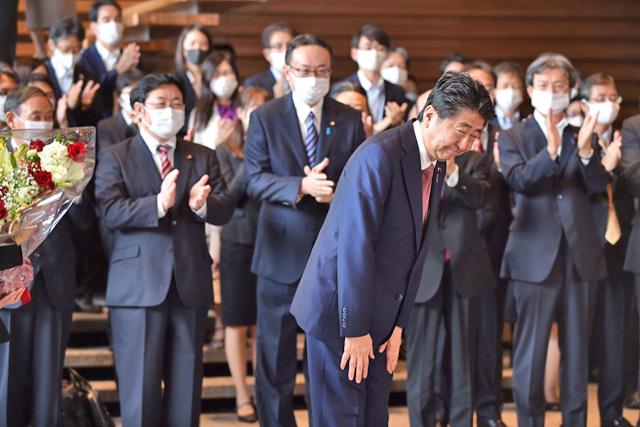- International News
- Thu-2020-09-17 | 04:10 pm

Nayrouz News Agency :
Shinzo Abe smashed records as Japan’s longest-serving prime minister, championing ambitious economic reform and forging key diplomatic relationships, while weathering scandals. But in the end, he was undone by his health.
The 65-year-old resigned on Wednesday after more than eight years in office over two terms, forced to step down with a year left in his mandate by a recurrence of the ulcerative colitis that has long plagued him.
He had been due to stay on until late 2021, giving him an opportunity to see out one final event in his historic tenure — the postponed Tokyo 2020 Olympics Games.
Instead, he handed the reins to his close adviser, Yoshihide Suga, in a bitter final act for Abe, whose first term was also cut short in part by his health.
Abe was a sprightly 52 when he first became prime minister in 2006, the youngest person ever to occupy the job.
He was seen as a symbol of change and youth, but also brought the pedigree of a third-generation politician groomed from birth by an elite, conservative family.
His first term was turbulent; shot through with scandals and discord, and capped by an abrupt resignation that made him the latest in a succession of short-lived Japanese prime ministers.
After initially suggesting he was stepping down for political reasons, he subsequently acknowledged he was suffering an ailment later diagnosed as ulcerative colitis.
They called it ‘Abenomics’
The debilitating bowel condition necessitated months of treatment, but was, he said, eventually overcome with the help of new medication.
Encouraged by Suga, he ran again, and the revolving prime ministerial door brought him back to office in 2012.
But then it slammed shut behind him, ending a turbulent period when leaders cycled through, sometimes at the rate of one-a-year.
With Japan still staggering from the effects of the 2011 tsunami and subsequent nuclear disaster at Fukushima — and a brief opposition government lashed for flip-flopping and incompetence — Abe offered a seemingly safe pair of hands.
And he had a
plan: Abenomics
The scheme to revive Japan’s long-stalled economy — the world’s third biggest, but more than two decades into stagnation — involved vast government spending, massive monetary easing, and cutting red tape.
Abe also sought to boost the country’s flagging birth rate by making workplaces more friendly to parents, particularly mothers, and pushed through controversial consumption tax hikes to help finance nurseries and plug gaps in Japan’s overstretched social security system.
While there was some progress with reform, the bigger structural problems for the economy remained. Deflation proved stubborn, growth anaemic and the economy was in recession even before the coronavirus wiped out remaining gains.
Abe’s star waned further during the pandemic, with his approach criticised as confused and slow, driving his approval ratings down to some of the lowest of his tenure.
‘Our fight will continue’
On the international stage, he took a hard line on North Korea, but sought a peacemaker role between the US and Iran.
He prioritised a close personal relationship with Donald Trump in a bid to protect Japan’s key alliance from the US president’s "America First” mantra, and tried to mend ties with Russia and China.
But the results were mixed: Trump is reportedly still eager to force Japan to pay more for US troops stationed in the country, a deal with Russia on disputed northern islands is elusive, and a plan to invite Xi Jinping for a state visit has fallen by the wayside amid growing domestic discontent with Beijing.
And while Abe has not repeated a 2013 visit to a controversial war shrine that sparked regional anger, he has pursued a hard line with South Korea over unresolved wartime disputes and continued to float plans to revise the country’s pacifist constitution.
Throughout his tenure, he has weathered political storms including cronyism allegations that dented his approval ratings but did little to affect his power, in part thanks to the weakness of Japan’s political opposition.
Abe will stay on as a lawmaker for now, with some speculation he could be called on for diplomatic endeavours in the future, given Suga’s inexperience with foreign affairs.
On Monday, after the ruling party elected Suga his successor, Abe pledged his support.
"Our fight will continue,” he said.













